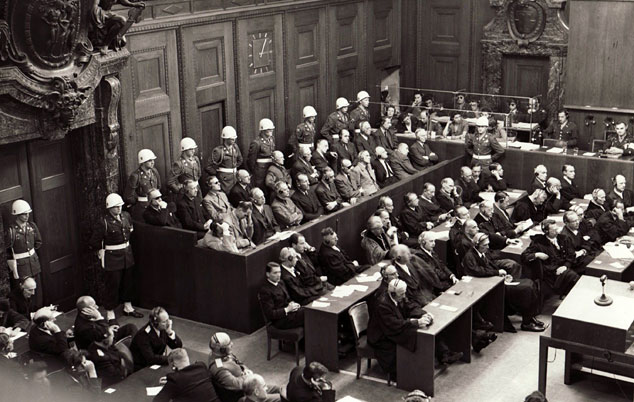
Indictments
Indictments were entered for the following crimes:
1. Common plan or conspiracy
2. Crimes against peace
3. War crimes
4. Crimes against humanity
Twenty-one of the original 24 indicted representatives of the Nazi regime sat in the docket of the Nuremberg Trial (November 20, 1945, to October 1, 1946). The trial against Martin Bormann was conducted in absentia, the charges against Gustav Krupp von Bohlen und Halbach were dismissed due to incompetence to stand trial, and Robert Ley had committed suicide before the trial began.
| Defendants and counts of indictment: | |
| Martin Bormann: | 1, 3, 4 (in absentia) |
| Karl Dönitz: | 1, 2, 3 |
| Hans Frank: | 1, 3, 4 |
| Wilhelm Frick: | 1, 2, 3, 4 |
| Hans Fritzsche: | 1, 3, 4 |
| Walther Funk: | 1, 2, 3, 4 |
| Hermann Göring: | 1, 2, 3, 4 |
| Rudolf Hess: | 1, 2, 3, 4 |
| Alfred Jodl: | 1, 2, 3, 4 |
| Ernst Kaltenbrunner: | 1, 3, 4 |
| Wilhelm Keitel: | 1, 2, 3, 4 |
| Gustav Krupp von Bohlen und Halbach: | 1, 2, 3, 4 (charges dismissed due to incompetence to stand trial) |
| Robert Ley: | 1, 3, 4 (committed suicide before the trial began) |
| Konstantin Freiherr von Neurath: | 1, 2, 3, 4 |
| Franz von Papen: | 1, 2 |
| Erich Raeder: | 1, 2, 3 |
| Joachim von Ribbentrop: | 1, 2, 3, 4 |
| Alfred Rosenberg: | 1, 2, 3, 4 |
| Fritz Sauckel: | 1, 2, 3, 4 |
| Hjalmar Schacht: | 1, 2 |
| Baldur von Schirach: | 1, 4 |
| Arthur Seyß-Inquart: | 1, 2, 3, 4 |
| Albert Speer: | 1, 2, 3, 4 |
| Julius Streicher: | 1, 4 |
Organizations charged in the indictments
Indictments were also entered against the Reich government, the leadership of the NSDAP, the SS and SD, the SA and Gestapo, and the General Staff and High Command of the Wehrmacht as criminal organizations.
Counsel for the defense
The defense lawyers were either selected by the jailed defendants themselves or appointed by the Tribunal at their request. The chief counsels of the individual defendants, who also testified before the Tribunal, were supported by a total of 70 assistants, clerks, and lawyers.



